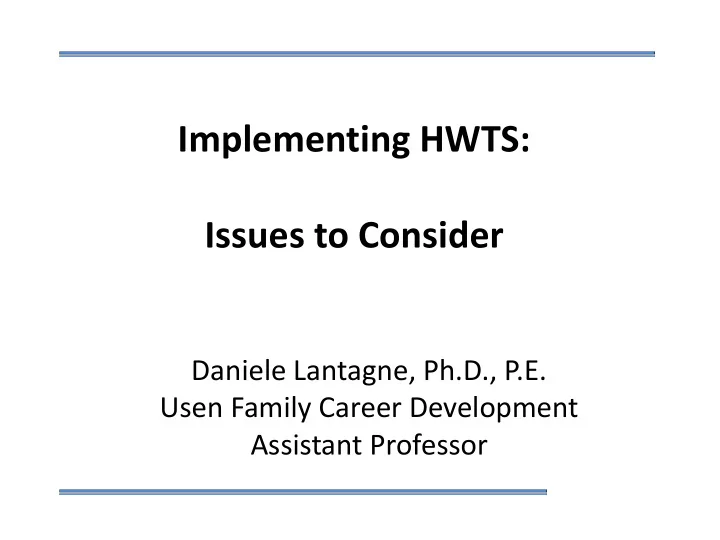

Implementing HWTS: Issues to Consider Daniele Lantagne, Ph.D., P.E. Usen Family Career Development Assistant Professor
Efficacy: Scheme, RCT Effectiveness: Scalable Impact in Real-World Programs
Efficacy: Scheme, RCT Manufacturing Appropriateness Design Training Evaluation Decision-making Distribution Effectiveness: Use Scalable Impact in Real-World Enabling Environment, Financials, & Policy Programs
Example
Design • Machine-made • Hand-made • 25$ • 125$ • Chlorine safe • Non-chlorine materials safe materials • Shippable • Limited • Design process production not complete
Design
Design • Design is iterative • If treatment technology changes, RCT/Scheme not valid
Manufacturing • Local – Quality control – Production capacity – Cost • International – Above, plus importation
Decision-Making & Appropriateness 97 100 92 87 90 A - Report Dispenser Use 81 B - Confirmed FCR >=0.2 mg/L 79 80 C - Effective Use 70 Precent of Households (%) 63 60 52 50 40 34 28 30 22 18 17 20 12 11 10 10 9 9 10 5 4 A B C A B C A B C A B C A B C A B C 0 A B C 0 Haiti Sustained Sierra Leone Sierra Leone DRC DRC Senegal Senegal Initial Sustained Initial Sustained Initial Sustained
Criteria for Implementation Haiti ✖ Use of point sources ✖ Sufficient population density to source ratio ✖ Source density in intervention area ✔ Minimum affected population ✖ Dispensers most appropriate option ✔ Minimum chlorine acceptability ✔ Access for evaluators ✔ Developing country ✔ Diarrheal disease risk
Criteria for Implementation Haiti Sierra Leone DRC Senegal ✖ ✖ ✔ Use of point sources ? ✖ ✖ ✔ ✔ Sufficient population density to source ratio ✖ ✖ ✔ Source density in ? intervention area ✔ ✔ ✔ ✔ Minimum affected population ✖ ✔ Dispensers most ? ? appropriate option ✔ ✔ ✔ ✔ Minimum chlorine acceptability ✔ ✔ ✔ ✔ Access for evaluators ✔ ✔ ✔ ✔ Developing country ✔ ✔ ✔ ✔ Diarrheal disease risk
Decision-Making & Appropriateness 97 100 92 87 90 81 A - Report Dispenser Use 79 80 B - Confirmed FCR >=0.2 mg/L C - Effective Use 70 Precent of Households (%) 63 60 52 50 40 34 28 30 22 18 17 20 12 11 10 10 9 9 10 5 4 A B C A B C A B C 0 A B C A B C A B C A B C 0 Haiti Sustained Sierra Leone Sierra Leone DRC DRC Senegal Senegal Initial Sustained Initial Sustained Initial Sustained
Distribution • Direct sales • BOP marketing Commercial • Organized/unorganized retail • Micro-enterprises CARBON CREDITS • Social marketing Quasi-Commercial • Microfinance institutions • Rural sanitary marts • Self-help groups • Mass distribution through Non-Commercial public sector, UN, NGOs, CBOs, etc.
Training and Use (Haiti Filtration) Biosand Biosand Ceramic Ceramic Sawyer Installed by NGO Installed by NGO at subsidized at subsidized Distributed for Distributed for Distributed for free, Program type price, regular price, regular free, free, variable follow-up follow-up with follow-up with no follow-up no follow-up local Technician local Technician Approximate date of 2013 2012-2013 2011-2013 2014 2014 distribution Geomean E. coli 29.3 485 78.5 3.92 8.61 (untreated) Geomean E. coli 1.14 4.12 16.4 0.33 0.65 (treated) Effective use (<1) 34% 16% 0% 24% 26% Effective use (<10) 34% 45% 9% 15% 17% Enabling Environment: <10 not accepted
Evaluation • We need to measure • Iteratively improve • Resources for this
Example Effective Long-Term Programs • Cambodia • Haiti – Ceramic water filters – Chlorine solution
Effective Use • More than a product • …that has an RCT or met Scheme requirements • Need • Well-designed, quality-controlled, and consistently manufactured product • Distributed using an appropriate mechanism in an area where it is acceptable • With sufficient training and materials to use • Where people actually use it • In a program providing ongoing M&E
Assumptions We can not assume a correlation between that the most efficacious products (RCT, Scheme) are the most effective after implementation attrition. …Implementation Matters
Thank you and I am happy to take questions. Daniele Lantagne, Ph.D., P.E. daniele.lantagne@tufts.edu
Recommend
More recommend